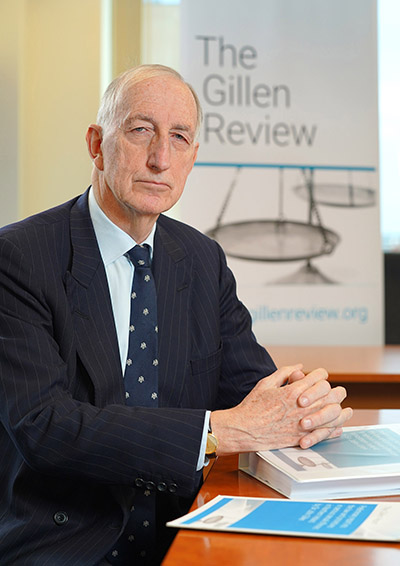Northern Ireland: Gillen rape trial review recommends legal advice for complainants and public to be barred from trials

Sir John Gillen
A major judge-led review of the administration of justice in serious sexual offence cases in Northern Ireland has issued 220 draft recommendations for consultation, including the provision of publicly-funded legal advice to complainants and restricted public access to trials.
Sir John Gillen, a retired Court of Appeal judge, was commissioned to conduct the review in the wake of a controversial nine-week rape trial in Belfast which ended with the acquittal of two high-profile rugby players.
His team has been in contact with over 200 individuals and organisations, including complainants, former defendants after acquittal, statutory and voluntary organisations, judges and legal professionals, to heard first-hand evidence.
The two-part report also draws on the experiences of 15 other countries and various jurisdictions across Europe (including Ireland), the US, Canada, South Africa, Australia and New Zealand.
It states: “Virtually without exception, every complainant to whom we spoke voiced the desire to have access to free legal advice during the whole process from report of the crime to trial.
“The absence of this arguably provides yet another impediment to complainants on the steep path from reporting to trial. It contributes to the troubling concept of complainants being alone against an array of defence lawyers, which in turn feeds into the unacceptably high under-reporting and attrition rates.”
Sir John said he believed legal representation for complainants should be funded through legal aid without means testing, which would likely require new legislation.
On restricting members of the public from attending rape trials in Northern Ireland, Sir John said “open justice is never an absolute concept” and the Belfast rugby rape trial had “illustrated distasteful aspects of voyeuristic and unsavoury interest in high-profile cases … turning courts into such a spectacle for voyeuristic entertainment value cannot be in the public interest”.
The public should be “excluded in all serious sexual offence hearings save for officers of the court, persons directly concerned in the proceedings, bona fide representatives of the press, a parent, relative or friend of the complainant or, where the accused is not of full age, of the accused”.
Other recommendations in the report concern the introduction of legislation to manage the danger of the inappropriate use of social media; the introduction of anonymity for suspects pre-charge; and measures to address the vast under-reporting of serious sexual crime.
Sir John said: “Sexual crime is one of the worst violations of human dignity. My aim is to recommend improvements in the ways in which our justice system deals with serious sexual crime while ensuring delivery of a timely, fair and just hearing for complainants and defendants.
“I have published my preliminary report for consultation to ensure that no voice is left unheard in this important and much needed review.”
The report is now available online and will be open for consultation until Friday 15 January 2019.




